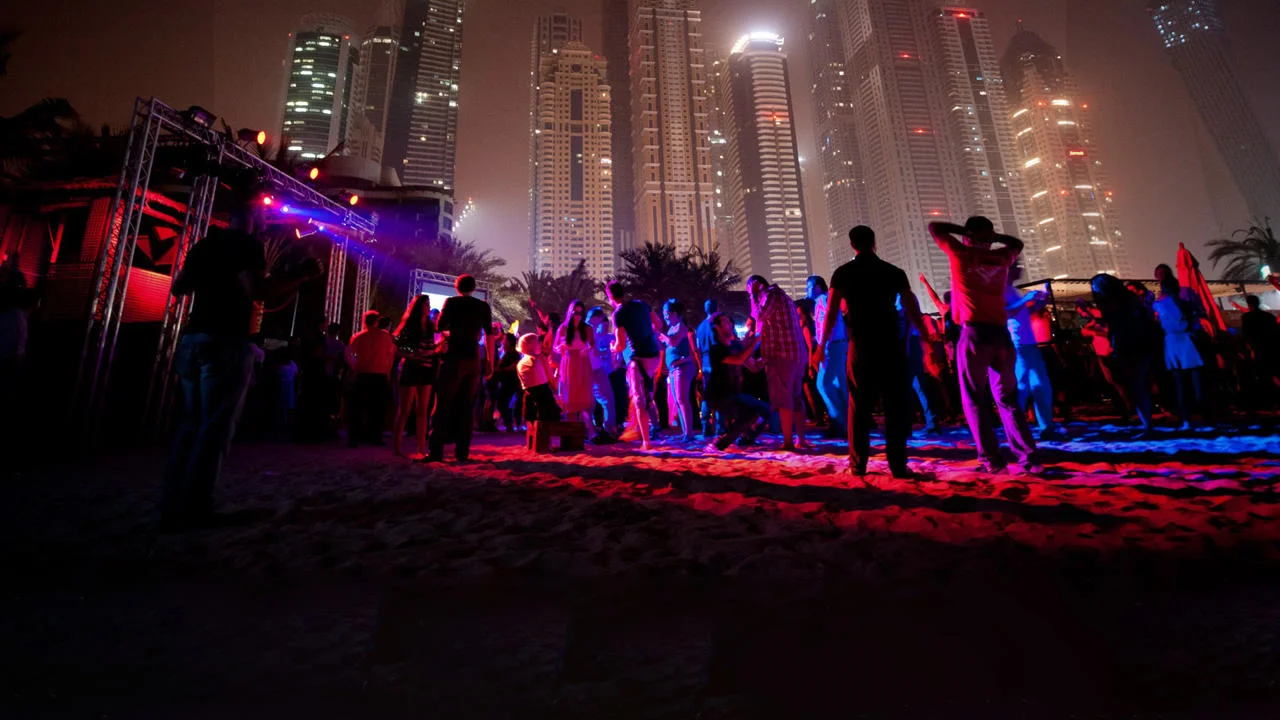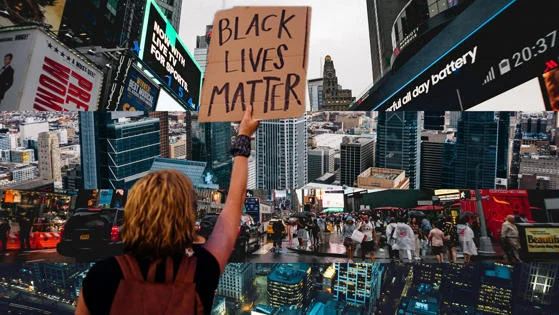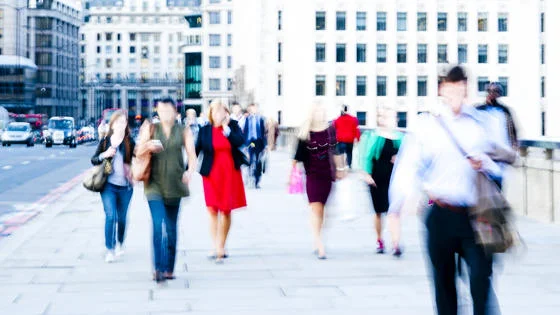Peril and privilege: gay expat nightlife in Dubai

Contents
How can a sense of belonging be forged in a setting where one’s existence is forbidden? That is the question that LSE’s Dr Centner and his co-author Harvard’s Manoel Pereira Neto explore in their groundbreaking research into Dubai’s expatriate gay men’s nightlife.
But it was not an easy topic to research. Dr Centner explains: "It's an illegal, or criminalised, identity and set of behaviours and practices, so in a very general sense, it's a taboo. And taboo subjects are very often under-researched, sometimes because people have a hard time gaining access, gaining that trust, but also because, even if people gain that access, there could be significant repercussions for themselves as researchers, or for the people who are the research participants.
"As two queer researchers, we were able to enter the worlds of relatively privileged Western gay expatriates. Secrecy is often the norm, but the field was familiar to us, through previous visits and research projects."
These were indeed ‘parties’ ...[but] not bars identified as gay. Not a single venue’s webpage uses the word ‘gay’ or related euphemisms, nor do they hint at targeting a gay crowd.
Avoiding the authorities
The researchers carried out fieldwork in Dubai, in stints, over a span of six years. They began with participant-observation in eight bars and clubs. They also conducted interviews, relying on personal contacts, to find 26 gay men, aged 24-48 and representing 15 nationalities. Most were single and had attended university in North America or Europe. They came from a wide range of salaries and occupations, including airline cabin crew and bankers. Just over half could be categorised as "white."
Their forthcoming paper explains: "Much of the Dubayyan gay nightlife takes place in venues within the city’s copious international hotels, which are technically open to all who can afford them. These palatial, shimmering structures are havens from the extreme heat, even hours after sundown."
The researchers wondered, at first, how so many men knew that these are events attended by many other gay men: "These were indeed ‘parties’ – on a specific night of the week for different sites – frequented by gays, not bars identified as gay. Not a single venue’s webpage uses the word ‘gay’ or related euphemisms, nor do they hint at targeting a gay crowd."
It transpires that all information about the parties is by word of mouth or WhatsApp group chats with other expatriates. As soon as a party appears on a TripAdvisor review or blog, it will either change name or venue, or both, to divert potential intervention by Emirati authorities. Gay dating apps are also shunned for fear of entrapment by police.
There’s this constant sense of your hair standing on end and having to be cautious about who's listening, who's at the door, who's invited, or what might be said and passed along, that could get us in trouble.
Inside most such venues, the researchers note that the music played is rarely the kind of remixed, beat-heavy tracks or classically "gay" songs that dominate in self-proclaimed LGBTQ bars across many global cities. And typically they did not observe same-sex physical contact, not even friendly gestures.
They say: "While the heavy-drinking culture of expatriate communities in Dubai is infamous, at these bars and clubs the men tend to keep their drinking in careful check, attempting to maintain control of their attitudes and expressions."
One interviewee tells the researchers: "We’re always with that fear in the back of our heads of drinking too much and ending up making a wrong move on the wrong person – someone who could end up calling the authorities."
Privilege and extreme wealth afford more freedom
However, there are occasional events where the most privileged enjoy an extraordinary amount of freedom. The researchers attended a more exclusive, much less inhibited, party at a hotel rooftop bar where men were openly kissing and cuddling, and the entertainment was a Lady Gaga-inspired drag performance. Only the highest-earning and most extravagantly wealthy of men, both Western and Arab, are self-assured enough to take part in these types of activity.
They explain: "This party was not a regular event, but there were similarly extravagant, debaucherous events that would happen irregularly elsewhere in the emirate, from penthouses to nearby desert locations…. Only those with the most cumulative privilege among a generally imperilled population of heterogeneous Dubai-based homosexuals would attempt to deploy this repertoire openly."
Finding your "gay family"
As you might imagine, it is in private homes where Western gay men experience the most freedom to build a "more robust sense of belonging, establishing supportive networks that reinforce their identification as both gay and Western, individually and as a group."
Most interviewees talked about needing to find their "gay family" in Dubai as soon as they arrived, so they might make a "home away from home."
Since most companies arrange randomly assigned housing in shared flats, it is up to gay men to ask heterosexual flatmates to switch with a gay contact, so two or more gay men can cohabitate and organise private and very selective social events.
In seeking some sense of home away from home... these men are, inadvertently, unwillingly, or in some cases, quite explicitly, keeping out other types of gay or queer people who are not ‘similar’ to them.
Solidarity amongst expats results in exclusion of others
Reflecting on the significance of the research, Dr Centner says: "In addition to bringing some attention to this kind of existence, it is also important to note how this is very much an expatriate, relatively privileged, experience of gay life in Dubai. So, part of what we try to do is to point out how, in seeking some sense of home away from home, that these men are, inadvertently, unwillingly, or in some cases, quite explicitly, keeping out other types of gay or queer people who are not ‘similar’ to them.
"Now what they think of as ‘similar’ to them, is actually quite broad. To see themselves as ‘Western’, is something that was not a register of identity that mattered to many of them before coming to the UAE. So, for a Luxembourger to see solidarity with a Peruvian, that's a very broad sense of ‘we are similar people’. But it does push away or create suspicions about other types of people, who potentially are in similar situations, but are not as Western culturally, maybe not as wealthy, or as socially and economically privileged."
How socially liberal is Dubai?
Dr Centner emphasises that Dubai is keen to project an image of being more socially liberal than the rest of UAE, as well as the rest of the Gulf:
"So even if homosexuality is illegal, Dubai doesn't want to be seen as specifically anti-gay. What is fuelling the fear are anecdotal cases that are highlighted occasionally in the media and end up being circulated among expatriates. I've never come across anything in the media that shows a large-scale action by the authorities.
"However, we felt that, in contrast to places where even if homosexuality is not illegal, but there's plenty of violent homophobia, everything felt more on edge in Dubai. People seem more vigilant and self-regulating, in a constant way. There’s this constant sense of your hair standing on end and having to be cautious about who's listening, who's at the door, who's invited, or what might be said and passed along, that could get us in trouble.
"Accusation, in theory, can substitute for proof in certain contexts within Emirati law, if there are enough consistent accusers, so that’s often in the back of people’s minds, shaping how and where they regulate appearances."
Dr Ryan Centner was speaking to Joanna Bale, Senior Media Relations Manager at LSE.
Download a PDF version of this article




